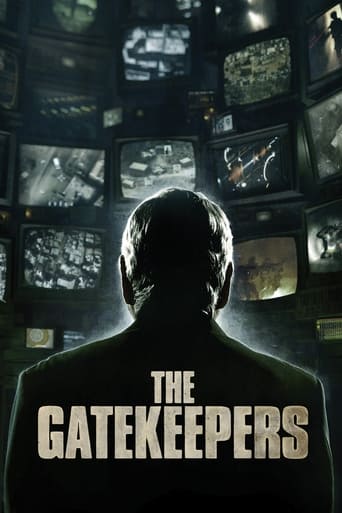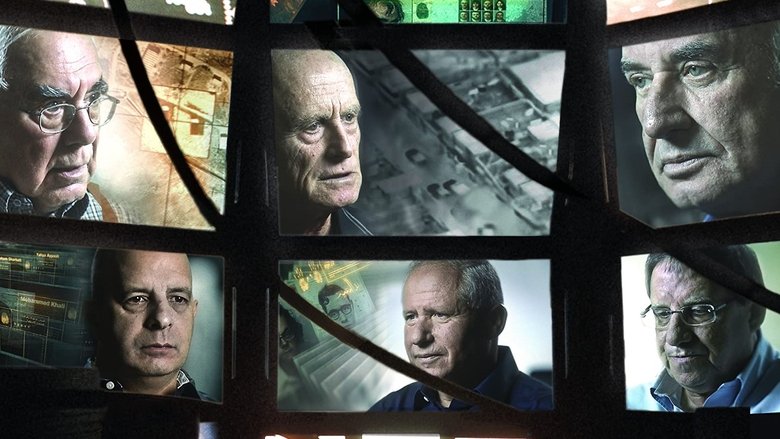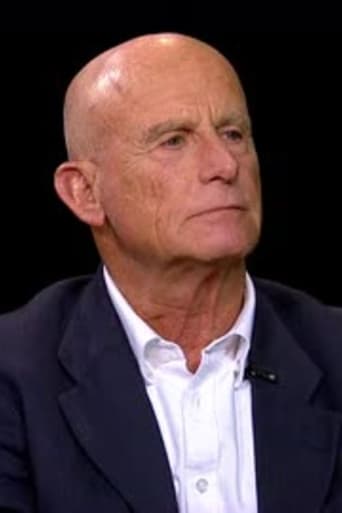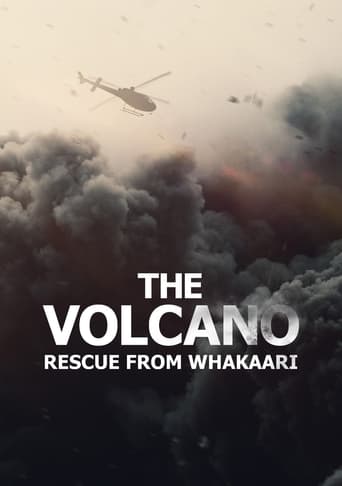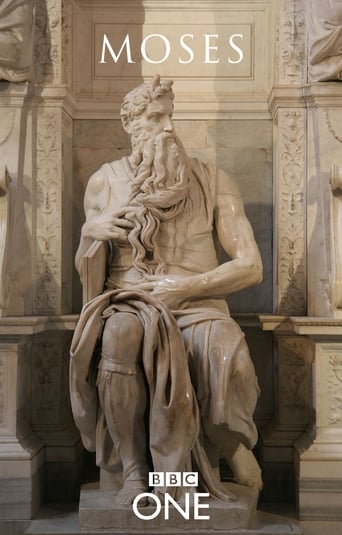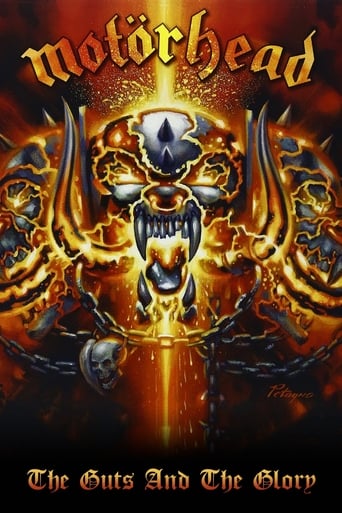The Gatekeepers (2013)
In an unprecedented and candid series of interviews, six former heads of the Shin Bet — Israel's intelligence and security agency — speak about their role in Israel's decades-long counterterrorism campaign, discussing their controversial methods and whether the ends ultimately justify the means. (TIFF)
Watch Trailer
Free Trial Channels
Cast


Similar titles
Reviews
Such a frustrating disappointment
Boring, long, and too preachy.
It’s fine. It's literally the definition of a fine movie. You’ve seen it before, you know every beat and outcome before the characters even do. Only question is how much escapism you’re looking for.
Great example of an old-fashioned, pure-at-heart escapist event movie that doesn't pretend to be anything that it's not and has boat loads of fun being its own ludicrous self.
Bring up the Israeli-Palestinian conflict and reactions typically vary from indifference to fanaticism -- with little territory in between. Indeed, the chasm of constructive dialog is currently so narrow, that merely reducing tension in this long-troubled region would be considered a historic success. That's how low the bar has been set. Stopping all violence is probably next to impossible. Achieving an everlasting peace between Jews and Arabs seems like a starry-eyed fantasy. Six reprehensible decades of hate have produced way too much blood, far too many deaths, too many cries for revenge, too many walls and checkpoints, too many suicide bombers, too many senseless attacks on innocents, too much pain, and far too few heroes willing to put an end to all the madness and misery. Amidst this backdrop of bleakness, there's a flicker of light. A documentary has come out which stands as the most unbiased overview of this terrible conflict in recent memory. The film seeks to accomplish what may be impossible -- establishing a consensus that the best way to achieve peace is adapting a two-state solution, which means creating an independent Palestinian nation. This declaration comes not necessarily from Palestinians, but from very knowledgeable Israelis, which makes the case for a two-state solution all the more convincing. The exclamation point on this manifesto comes when taking into account the backgrounds and allegiances of these Israelis now trumpeting the loudest for a Palestinian homeland -- who feature prominently in the film. "The Gatekeepers," released in late 2012 but is just now making its way to theaters in several American cities. This groundbreaking Israeli film, nominated for a "Best Documentary" Oscar, is a serious-minded look at the history of violence in Israel and the occupied territories since the end of the 1967 Six-Day War. It's an indisputable historical record of the conflict which unintentionally created what now seems to be irreparable divisions between nations, religions, and cultures. Indeed, if the West's troubles with international terrorism and our burdens in the Middle East have an epicenter, it's neither in Iran, Iraq, or Afghanistan. Long before 9-11 and its two-war aftermath, tempers reached the boiling point a very long time ago over the land once called Palestine. "The Gatekeepers" is almost entirely in Hebrew, with English-language subtitles. That's because the six key personalities interviewed in the film are all Israelis. Remarkably, all six of the "stars" of this film are the former heads of Shin Bet, Israel's domestic security agency. To make things clearer, Shin Bet handles Israel's domestic conflicts, which includes the occupied territories -- comprised largely of Palestinians. This is a dark (and at times, depressing) movie. There's not much here to rejoice about. The substance and style of the film is something you'd expect to see on The Military Channel. Intelligence gathering, counter-terrorism measures, political considerations, and the day-to-day business of Shin Bet is portrayed here as never shown before. Alas, other than these six heads of the agency, virtually all Shin Bet operatives remain anonymous. Grainy black and white images from actual targeted assassinations are shown. One sees precisely how and why specific "terrorist" targets are chosen and the reasons certain enemies are eliminated. We also see what happens when things go terribly wrong, which does occur with greater frequency than many may realize. Regardless of one's personal opinion in the conflict, you can't help but be dazzled by the organization and capabilities of this extraordinary organization. But what truly makes "The Gatekeepers" a landmark achievement is the unmasking of former Shin Bet heads who all speak with remarkable candor about what they've done in the past and what they now believe about the best prospects for peace in the future. The intelligence commandos agreed to be interviewed -- each one independently -- for the first time ever on camera. What they say needs to be heard, and heralded. "The Gatekeepers" surpasses what's typically expected from this method of storytelling because it ends up challenging so many conventional assumptions. For instance, I didn't expect to by sympathetic towards Shin Bet or it's former leaders. I just assumed these intelligence/military operatives would share the dangerous hard-line fanaticism of Benjamin Netanyahu and his Right-Wing followers, who are willing to justify any action necessary for the defense of Israel no matter how much collateral damage is done. But these assumptions aren't at all reflective of these men or what they now believe. Indeed, the 90-minute film builds slowly towards that gradual transformation of opinion among all six agency heads -- each independently reaching an identical conclusion. That each of these men -- of different ages and having served at different periods -- finally came to realize that the Palestinians might actually have a legitimate case for their fury wasn't just surprising, but shocking. This is ultimately why "The Gatekeepers" soars. It defies expectations. It reveals things aren't what they seem and most certainly aren't black and white. They are increasingly gray. Assuming you care about the future and what is perhaps the most important area of dispute in the world, this is a movie that you'll be thinking about long after you've departed the theater. Unfortunately, few people will get that chance. Few Americans care enough to go see a documentary about some war being fought in a faraway place. Why try and learn about history and current events when instead you can pay $10 to shut off your mind and become a vegetable for 95 minutes? But this is a movie made for everyone else. "The Gatekeepers" pulls no punches and gets few style points. But it sure is thought-provoking. One can only wish the right people will see it and take note of what these remarkable experts in their field are saying, and then listen. It might be the only hope we have extinguish the fires of conflict while fanatics on both sides ceaselessly continue to pour gasoline on the flames.www.nolandalla.com
Israeli cinema has produced quit a few remarkably courageous movies in the last few years - "Waltz with Bashir", "Lebanon", "Defamation", and now this one ("Five Broken Cameras" is also partly an Israeli movie). It's not easy to ask tough questions about some policies and deeds of your country, but thankfully, it seems there are quite a few Israeli filmmakers ready to do that.It's quite a sound of alarm for politicians when former high up security officials accuse a total lack of direction and political leadership (no "wise old man" at the top), no strategy for the "Palestinian question"; it's also remarkable how most of them point out that winning the war is futile without a political settlement - especially when somebody that had no gripes to order the murder of 2 Palestinian terrorists in Shin Bet custody says it. Too bad I hear the Israeli prime minister has already said he will not see the movie - probably to prove the points these guys were trying to make about the failure of politicians' leadership (or lack thereof) :).Ami Ayalon seems the most poignant critic of all the six, while it might only be my mistaken impression, but Avi Dichter (the 2000-2005 guy) was the least critical. It should probably be no surprise that the former was the first to be contacted, the first to accept and the one who helped get the others on board as well.With such a broad subject, it's hard to decide what to discuss and what to leave out. I think the case of the Israeli terrorists that wanted to bomb the Haram was quite shocking - especially when you think that Palestinians are regularly thrown in jail for many years for the same kind of offenses, while these guys got our quickly and got to be interviewed on TV and say they regret nothing. I also didn't see those guys blindfolded and handcuffed. Talk about double standards.On the other hand, I was a bit puzzled about the film's short, passing reference to Lebanon, only to mention that the same kind of tactics as in the Occupied Territories were used. I would've left Lebanon out completely (since the movie is mostly about Israelis and Palestinians), or maybe mentioned how different the security situation in Lebanon was - that's possibly the only war that Israel lost. At least according to Robert Fisk, the fierce resistance that the Lebanese put up inspired the First Intifada.All in all, a very good movie that should also be interesting for people who don't care too much about the Middle East or Israel/Palestine (all the more rewarding to those who are interested, of course). A good lesson about the futility of security, which simply can't replace good politics. Very useful in an age of scaremongering.
I lived thru most of the events mentioned in Documentary. The Shabac is only One of the Military Services Involved in Policy and Decision Making. There were hints at the Crux of the Problem in Israel. The PR Election System Similar to Italy after WW2 and Other countries that had PR Proportional Representation mainly from WW1 to WW2. Also Lebanon suffered from Sectarian Politics. Lebanon had a Crisis in 1958 and 1975 when Consensus broke down. Or Holland after Right wing Leader was Shot. But a must see for anyone interested in The Israeli Palestinian Conflict. Quite Detailed Collection of Different Sources about Rabin assassination. Settling of West Bank, The "Wall" and Other Issues. Also I add the Modern Issue of Asymetric Warfare and Asymetric Politics. Uncle Sam.
You would normally bet that the chances of six former directors of the Israel Internal Security Service known as Shabak or, in English, Shin Bet becoming left-leaning proponents of a peaceful solution with the Palestinians would be about as likely as Dick Cheney becoming a political consultant for MSNBC. Yet, as depicted in Dror Moreh's powerful and disturbing documentary The Gatekeepers, this is exactly what happened. The film, one of five Oscar-nominated films for Best Documentary, consists of interviews by the director with Shin Bet spokesmen: Avraham Shalom, Yaakov Peri, Carmi Gillon, Ami Ayalon, Avi Dichter, and Yuval Diskin, interspersed with newsreel footage and CGI graphical recreation of the seemingly endless conflict since 1967.Moreh asks tough questions and does not let his subjects off the hook, but there is no need to. The men are forthcoming in their candid assessment of the role they played in the Shin Bet operations which included the recruitment and use of informers, the targeting and drone attacks on suspected terrorists (sound familiar?), use of brutal torture techniques, and controlling the threat of Jewish extremists, a threat that became reality when a right-wing opponent of the Oslo peace agreements shot and killed the architect of those agreements, Nobel Peace prize winner Prime Minister Yitzak Rabin.Two horrific events are dramatized: the assassination of Palestinian terrorist Yahya Ayyash by planting an explosive device in his cell phone, and the skull bashing of two Palestinian terrorists involved in a bus hijacking after they had been subdued and captured, an action that led to the resignations by the Prime Minister and the then head of the Shin Bet. To their credit, however, the security agency called off dropping a bomb on a house filled with Hamas leaders because of the possibility of widespread collateral damage. The men were hardliners to begin with, but each, who has had to deal with the problem first-hand, has come to see the futility of an occupation that seems to lead only to an endless cycle of brutality on both sides.They insist that continuing to talk with the Palestinians is the only option left and that anything else is a dead end street. Though they favor a two-state solution, they recognize that the opposition to dismantling the settlements might cause a civil war. If you are wondering how the six could have reached the same conclusions, Ami Ayalon tells us that "The six of us reached our opinions from different personal backgrounds and different political outlooks, but we've all reached the same conclusion. Many Israelis and American Jews want to deny it, but this is our professional opinion. We're at the edge of an abyss, and if Israeli-Palestinian peace doesn't progress, it's the end of Zionism." Though these men are patriots who believed they were doing the right thing for their country and still believe that a great number of Jewish lives were saved by their actions, they also acknowledge their struggle with the moral dimensions of the job, the thin line between taking a life and saving a life. Shalom's comments are telling, "We have become cruel to ourselves but mainly to the occupation," he says. "We paid a horrible price for our military successes. We are isolated completely from our neighbors, we cannot go anywhere. We are a thorn in the side of the region." According to Ayalon, "The tragedy of Israel's public security debate is that we don't realize that we face a frustrating situation, in which "we win every battle, but we lose the war." The Gatekeepers shows a side of the Israel-Palestinian conflict that we have not seen before and, considering the ultra-secret nature of the counter-terrorist organization, it is remarkable that Moreh was even able to conduct the interviews. Yet the impact of the film has yet to make much of a difference. In his speech prepared for delivery at the Oscars in event the film won the award for Best Documentary, Moreh said, "We pray that it (the film) will echo in the corridors of power in Washington, Berlin, Paris, London, and especially in Jerusalem and Ramallah." To this date, the only echo heard is the sound of doors being closed.

